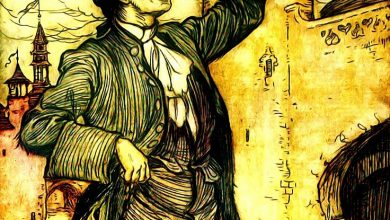A Horse and Two Goats is a short story by R.K Narayan which follows the life of Muni, an old man from a quaint little town of Kritam and his funny interaction with a robust American. This story highlights the yawning cultural gaps existing between the two people from opposite parts of the world and their desperate and humorous attempts at bridging the gap so as to arrive at a point of understanding. A hilarious tale of communication through miscommunication, this story also does a great job in showcasing the different perspectives we take on life and how our perspectives are shaped by the technology and culture of the society we live in.
Got No Time? Check out our Quick Revision Section
A Horse and Two Goats | Summary and Analysis
By the time we meet Muni in the story, his glorious days are over: his flock of forty sheep and goats have been reduced to two, he has lost most of his teeth and he is approaching the sunset of his life. His millet diet has been replaced by drumstick leaves and his teeth have been replaced by – well, nothing. And this toothless old chap craves for big things, or so his wife complains, all because one fine day he expresses his deepest desire to chew the “drumstick out of sauce”. His wife tells him to fetch the items necessary for its preparation, saying :
“But first get me all the stuff , including a measure of rice or millet and then I will satisfy your unholy craving” as she reasons “After all, next year you may not be alive for anything”.
Now this might be a very mean and a really horrible thing to say – but you see, this is love. Long term loves have a morbid sense of humor which you and I will never be able to understand.
Anyway, our man Muni goes to the shop and tries to humor the spokesperson and coax him into lending some money .
One day, on being severely questioned by the shopkeeper, Muni promises pay him back the following month. Muni says that his daughter will be sending some money for his birthday. Actually, there is no birthday. Later on, we come to know that he doesn’t even have a daughter in the first place.
After returning home, his wife packs him off along with his goats on whom he vents out his pent up frustration :
” He urged and bullied the goats until they meandered along the foot of a horse statue on the edge of the village.”
As he is sitting at the foot of the statue, Muni notices a new type of vehicle coming along when it sputters and stops in front of him. This leads to his encounter with the driver of the car – a red faced foreigner. A series of miscommunication arising out of the cultural gap between the two is used by R.K Narayan to bring out a pleasant humor and subtle satire his situational comedy is often fraught with.
The foreigner inquires about a “gas station” in the middle of the nowhere when his attention is immediately arrested by the wooden horse under whose shade Muni has been resting. Muni, on seeing him clad in khaki clothes: Muni mistakes him for a policeman. The foreigner tries to bridge the gap with a namaste – the stereotypical Indian salute in the Western imagination. Muni responds with yes and no, and after having exhausted his English vocabulary, begins to introduce and defend himself in Tamil. Remembering the “courtesy of the season”, the American offers Muni a smoke – as if all forms of courtesies were the same across different cultures.
“When the foreigner flicked the lighter to offer it to him Muni felt so confused about how to act that he blew on it and put it out.”
The humor derived from this interaction is also indicative of the cultural differences existing between the two. After finally sharing some smoke the foreigner takes out his wallet and presents his card – turns out to be a New Yorker. Muni, mistaking him to be a policeman presenting a warrant to arrest him defends himself in chaste Tamil, saying that he did not commit the murder that had recently taken place!
The American, unable to make any sense of what is being spoken about asks in frustration whether he can understand a single word in English, adding: “Everyone in this country seems to know English.”
Well, he is clearly mistaken
The awkward conversation continues for some time. The foreigner is fascinated at the pure sound of stimulating Tamil and regrets at not having brought his tape recorder. The conversation slowly turns towards the statue of the wooden horse under which Muni has been sitting. When Muni notices the fascination of the American with the horse, he goes on to explain it to him, pointing at the horse about how it represents Kalki.
By the time Muni is talking about the American’s children, the latter flourishes a hundred rupee note. Taking note “of the financial element entering the talk” Muni mistakes it for the price being offered for the goats.
The missing of the references continues when Muni tells the man to carry the goats out of his sight, “otherwise they will never follow but only me even if I am traveling to Yama Loka.”
This is it another joke lost on the American and this is precisely what makes it funny.
Finally, the goats return to Muni’s house at night, despite his explanation of having sold them for hundred rupees.
He gets an earful from his wife. His ruin is complete.






Far better than the so called guidebooks in the market. You guys are awesome !